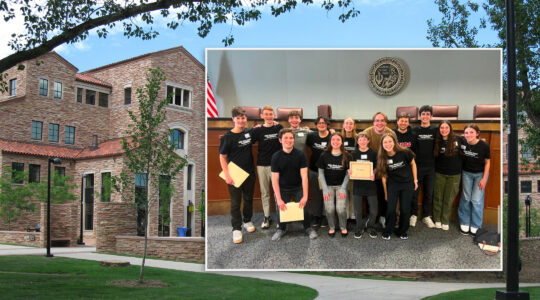Question: what do Texas Gov. Rick Perry, Rep. Michelle Bachmann of Minnesota, Sarah Palin of Alaska and Glenn Beck of radio and television fame have in common?
Answer: they are high-profile figures who are highly outspoken in their support for Israel — and the very mention of their name may well give hives to the majority of American Jews.
It’s a dramatic and worrisome sign of a national trend showing conservatives and liberals parting ways on the subject of Israel.
There was a time, not that long ago, when Democrats and Republicans, for all their differences, shared a strong commitment to the State of Israel, and saw eye to eye on policy issues related to security, the Arab-Israeli conflict and diplomatic efforts to bolster Jerusalem.
But as a national Gallup poll reported earlier this year:
“Republicans continue to be Israel’s strongest U.S. supporters: 80 percent sympathize more with the Israelis in the conflict, substantially higher than the 57 percent of independents and Democrats sharing this view. A similar pattern is seen by political ideology, ranging from 74 percent among conservatives to 49 percent among liberals — with liberals the least supportive of Israel of any group Gallup measured.
“Over the past decade,” the survey noted, “Republicans have consistently shown greater support than Democrats for Israel; however, the partisan gap has widened, with Republicans becoming even more supportive between 2001 and 2003 and since 2009. Independents’ support for Israel also increased to around 60 percent in recent years, up from 42 percent in 2001. At the same time, Democrats’ support for Israel has been fairly flat.”
While most American Jews, according to surveys, disagree with Republican positions on a wide range of domestic issues, from abortion to gay rights to teaching creationism in public schools, the strong support for Israel coming from those on the right is a source of comfort — and sometimes confusion.
Another related trend is the growing gap between Orthodox and non-Orthodox Jews in this country, with political views a prime case in point. In most Orthodox synagogues, for example, support for the Jewish communities in the West Bank is a given, and President Barack Obama is widely distrusted and disliked, primarily because of his Mideast policies.
A key question in determining Jewish voting patterns is how much of a factor in one’s voting decision is the candidate’s views on Israel and the Mideast.
Bill Keller, the outgoing executive editor of The New York Times, entered the fray on religion and politics last week with a column called “Asking Candidates Tougher Questions About Faith.” While he needlessly mocked those with strong religious beliefs, comparing their views to those who believe “space aliens dwell among us,” he noted that with two Mormons in the Republican race (Mitt Romney and John Huntsman) and fundamentalist Christian views being expressed regularly by Bachman and Perry, this primary season “offers us an important opportunity to confront our scruples about the privacy of faith in public life — and get over them.”
He’s right that if and how a candidate’s faith affects his or her politics should be discussed. Some observers have noted that journalists covering religion have been asking these questions for some time now. More such questions would be welcome.
The great majority of American Jews have been steadfast in their belief in the separation of church and state, and the benefit it accrues for our community. All Americans have a right to learn more about the emerging candidates’ views on whether and how religious views should play a role in political decisions.
The New York Jewish Week brings you the stories behind the headlines, keeping you connected to Jewish life in New York. Help sustain the reporting you trust by donating today.




